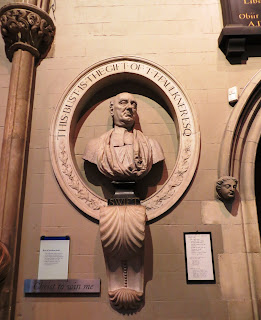We were only going to get one full day in Dublin, clearly not adequate. Fortunately the Grand Canal Hotel was near to the center of town and Dublin is a very fine walking town. Trinity College was only 10-15 minutes away, and the first stop to visit the world-famous library and th star attraction, the venerated medieval illuminated text, the Book of Kells. The book contains Latin transcriptions of the four Gospels, intricately illustrated, and probably was produce by monks in the 9th century on the isle of Iona off the Scottish coast. Soon they moved the monastery to Kells (not far from the Hill of Tara) after, what else, Viking raids, where it remained until it was moved to Dublin in 1653, again for security reasons. Wags have dubbed the exhibit the “Page of Kells” as you only get to directly inspect only two pages, but the introductory rooms are full of enlarged images and great detail in all aspects of medieval book-making, from the vellum page material, to the binding, illustrations, and calligraphy. The wallpaper for this blog has multiple copies of one of the most famous pages, called Chi-Rho for the two prominent Greek letters that begin the spelling of “Christ”.
 |
| The Long Room |
The line then continues upstairs where you walk through the
extraordinary “Long Room” of the library, lined with shelves of ancient tomes
and busts of revered scholars. You can also view more recent items such as this
first edition of “Waiting for Godot” from 1952, a rehearsal copy annotated by
Beckett for its premier production.
They also display the national symbol, the oldest existent
Irish harp from the 15th century.
Strolling the campus revealed other points of interest, such
as the Berkeley Library (named after the same George Berkeley as is UCB),
 |
| Berkeley Library |
a skeleton of the extinct giant Irish Elk, preserved
in a bog (many castles are festooned with their humongous antlers),
and their own
Campanile
We took a cab a few miles to the west to visit KilmainhamGaol. It was built in the 1790’s and closed in 1924, and in addition to
thousands of petty and felonious inmates, held Irish rebels from the uprisings
of 1798,1803,1848, 1867, and 1916, as well as Irish Civil War in the 1920’s. It
was here the British executed 14 of the leaders of the Easter Rising of 1916.
Initially not a popular movement, the stories of the firing squards enraged the
populace and is largely credited with lighting the fire in the War of
Independence, resulting in the creation of the controversial Irish Free State
in 1922. The tour was quite moving, and the guide well-informed. You may recognize
the cell block from numerous films, most notably the original “Italian Job” and “In the Name of the Father”.
 |
| Recognize this? |
There was barely time for a quick stroll through the heart
of town, divided by the river Liffey.
O’Connell St. is a main boulevard
crossing the river where the 120 meter tall Spire (AKA the Monument ofLight) stands on th spot previously home to a statue of Lord Nelson (blown
up by th IRA in 1966).
This is also in front of the General Post Office,
briefly held by supporters of the Easter Uprising in 1916, and the Ionic
columns in front still bear scars from the British assault.
One can pay respects to the bust of James Joyce in St.
Stephen’s Green,
and visit the two major churches: St. Patrick’s Cathedral,
where Jonathon Swift of Gulliver” fame
was dean from 1713-45,
 |
| A monument to Swift |
and nearby Christ Church Cathedral. Both are Protestant
churches now, attesting to the on-going influence of centuries of British
domination.
The National Library was joining in on the 50th
anniversary of JFK’s visit.
It so happened that both Florry and Sarah were passing
through Dublin, so we met that night for a grand dinner with some of their
other friends. This gives me one more chance to point out Irish specialties.
The restaurant had Jelly and ice cream on the dessert menu,
and a fancy version of black pudding as an appetizer.
Black pudding (a meat-byproduct concoction with grain
and blood) and white pudding (the same without the blood) are part of a
wholesome Irish breakfast.
 |
| A more typical presentation of black and white puddings at 12 o'clock |
As a special going-away present, Florry procured a limited
edition Cadbury Chocolate bar with
crumbled cheese and onion Taytos. Very
touching!
So pack up, off to the airport the next day for Norway to end a whirlwind 8-day tour of the Emerald Isle. It was much too brief, and left lots of places to see, music to hear, pubs to visit, and new and old friends to meet on our next trip here.














No comments:
Post a Comment